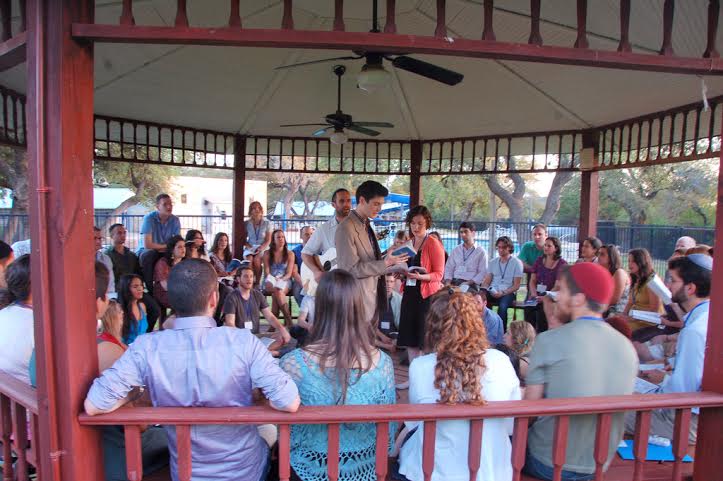This weekend in a meta sort of twist 49 young Jews will gather in suburban Boston for a retreat about Jewish retreats.
The gathering’s sponsors — Moishe House and Schusterman Connection Points, a program of the Charles and Lynn Schusterman Foundation — have even invented a new word, “retreatology,” to describe the “art of Jewish retreat-making” and use as a name for the upcoming weekend.
The two-day gathering at a retreat/conference center in Dover, Mass., aims to give participants “personalized guidance and skills to help build their own regional retreats to elevate their communities back home.”
Moishe House staff conceived of the retreat because, since 2011, when it hosted its first “learning retreat,” such immersive gatherings have become increasingly popular. The group, a global network of houses sponsoring Jewish programming created by and for 20-somethings, has run 26 retreats in the past three years and has 26 more scheduled for 2015.
Coming this weekend are a mix of Moishe House residents and alumni, members of the Schusterman foundation’s ROI Community and staff members of various Jewish organizations. On the schedule are such sessions as “Jewish values for retreat making,” “The 48-hour revolution” and “Mishpacha huddle.”
Martin Storrow, Moishe House’s director of leadership development and one of the organizers of this weekend’s retreat, said one of the key ingredients for a successful retreat is “creating a space for vulnerability.”
“The sooner we can create a safe space that encourages people to open up and share and the sooner they come together, the deeper the transformation that can happen,” he explained.
Good content, time and space for participants “to digest the experience” and celebration are also important, said Joel Stanley, Moishe House’s director of international programming and another Retreatology organizer, told JTA.
“A lot of people start with the schedule and think what types of activities should we have, when will we have lunch, when should we have getting-to-know-you activities,” Storrow said. “We prefer to start with what is the arc of the experience emotionally and relationally that we want people to have. Once we have that big picture, then we can think about what layers to put in.”
So what’s it like to run a retreat about retreats? Doesn’t the subject matter create added pressure for planners to get every detail right?
“It’s interesting, because we’re putting together an experience which in some ways resembles a regular Moishe House retreat and at the same time we’re pulling back the curtain on our planning process,” Stanley said.
“The good news is we don’t believe retreats should be perfect,” Storrow said. “That takes a lot of the pressure off. For most people the retreat experience is very personal, and a lot of the most magical moments might come from things that were totally unplanned, things we have nothing to do with. It’s about creating a comfortable space for people to come together and learn.”

Help ensure Jewish news remains accessible to all. Your donation to the Jewish Telegraphic Agency powers the trusted journalism that has connected Jewish communities worldwide for more than 100 years. With your help, JTA can continue to deliver vital news and insights. Donate today.






